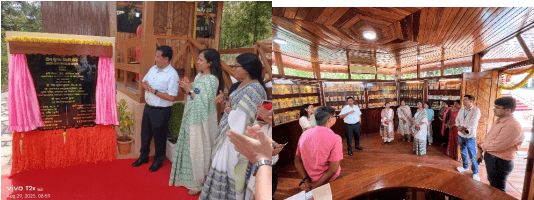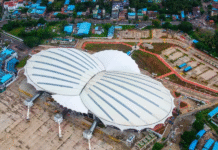A new initiative to strengthen agri-marketing and promote local produce took shape with the inauguration of the Dweep Sugandh-Sale Outlet at Haddo in Sri Vijaya Puram. Conceptualised and established by the Department of Agriculture, the outlet is designed to be a common platform for farmers, self-help groups, entrepreneurs, and artisans to directly reach consumers. It aims to provide fair price realization for producers while offering authentic, quality products to the people of the islands at reasonable rates.
The outlet brings together a wide variety of products under one roof. Items on display include locally grown spices, processed foods, handcrafted soaps, handicrafts, and other value-added goods. Special focus has also been given to showcasing products from Sagarika, Vatika, self-help groups, GI-tagged produce, and tribal crafts. By creating a single marketplace for diverse island products, the outlet is positioned as both a sales hub and a cultural showcase of the region’s unique resources.
For farmers and producers, Dweep Sugandh represents a step forward in creating direct linkages with consumers. Traditionally, producers in the islands have struggled with limited access to markets and middlemen-driven pricing. The outlet offers them a structured platform where products can be marketed transparently, helping them secure better returns. For consumers, it assures access to locally sourced, hygienic, and authentic goods that carry the distinctive identity of the islands.
The initiative also has a wider economic goal of empowering the farming community and generating livelihood opportunities. By integrating the efforts of small producers, SHGs, and tribal artisans, it creates a networked marketplace that strengthens the agriculture-based economy of the islands. The Department of Agriculture has positioned Dweep Sugandh not just as a sales point but as a step towards building long-term resilience for local producers by encouraging branding and value addition.
The inauguration of the outlet also ties into the administration’s larger vision of boosting agriculture-based souvenir tourism. With rising tourist inflow into the Andaman and Nicobar Islands, there is growing interest in locally made products that capture the culture and heritage of the region. By branding and marketing spices, handicrafts, and tribal produce under a common identity, the outlet aims to enhance the visibility of island products at both the national and international level.
The presence of officials from agriculture, forestry, rural development, and self-help group members at the event highlighted the inter-departmental cooperation that underpins the initiative. The establishment of the outlet is not just an agricultural measure but part of a broader strategy to integrate rural development, women’s empowerment, and heritage preservation into the economic landscape of the islands.
For the farming and SHG communities, Dweep Sugandh also represents recognition of their efforts in sustaining the agricultural traditions of the islands. By providing a direct market and the possibility of branding their produce, it gives small producers a chance to compete in wider markets. The inclusion of GI-tagged products is particularly significant, as it leverages intellectual property recognition to enhance the value of island specialties and protect their authenticity.
As Dweep Sugandh opens its doors, it signals the start of a new phase in agri-marketing for the islands. Whether it is spices cultivated in local farms, soaps handcrafted by SHGs, or crafts made by tribal artisans, the outlet consolidates diverse products into a single, consumer-friendly space. By combining economic empowerment with cultural promotion, the initiative is expected to not only support local producers but also build a stronger identity for the Andaman and Nicobar Islands on the national map.





